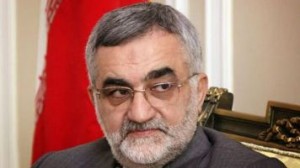 Chairman of Iran's Majlis Committee on National Security and Foreign Policy Alaeddin Boroujerdi[/caption]
Chairman of Iran's Majlis Committee on National Security and Foreign Policy Alaeddin Boroujerdi[/caption]An Iranian lawmaker says the Additional Protocol is in Majlis but at present Iran�s parliament will not agree to accept it
�Regarding the Additional Protocol, Majlis has approved a law obliging the government to suspend the voluntary implementation of this protocol which was being carried out at a certain point,� Chairman of Majlis National Security and Foreign Policy Committee Alaeddin Boroujerdi said Monday.
�Therefore, [US Secretary of State] John Kerry should know Majlis has the authority to decide on this issue,� he added
�As long as unfair and irrational US policies continue, Majlis will not authorize the acceptance of the Additional Protocol because lawmakers are highly sensitive about safeguarding national interests,� he added.
Boroujerdi said Iran has been unfairly and illegally hit by UN Security Council sanctions and is also the target of unilateral US-engineered embargoes.
Speaking to CBS News flagship 60 Minutes on Thursday, Kerry said the sanctions could be eased if Iran takes certain measures, including signing the protocol and reducing the level of its uranium enrichment.
Boroujerdi said that Iran started to enrich uranium up to 20 percent to provide fuel for Tehran's Research Reactor, which produces medical isotopes for cancer patients, to save the lives of 800,000 Iranian patients after the International Atomic Energy Agency (IAEA) failed to fulfill its responsibility to help provide the country with the required uranium.
He stressed that Iran�s uranium enrichment activities were peaceful and within the frame work of the Non-Proliferation Treaty (NPT) and the IAEA regulations.
Tehran had voluntarily implemented the Additional Protocol, which is non-binding, for two and a half years, but suspended the it after the UN Security Council �interfered� in the country's nuclear program and slapped sanctions on the Islamic Republic.
The Additional Protocol requires member states to provide an expanded declaration of their nuclear activities and grants the agency broader rights of access to their nuclear sites.
The United States, Israel and some of their allies have repeatedly accused Iran of pursuing non-civilian objectives in its nuclear energy program, with the US and European Union using the claim as an excuse to impose illegal sanctions against Tehran. The bans come on top of four rounds of US-instigated UN Security Council sanctions against Iran under the same pretext.
Iran has categorically rejected the allegation, stressing that as a committed member of the IAEA and a signatory to the NPT, it is entitled to develop nuclear technology for peaceful purposes.
The IAEA has conducted numerous inspections of Iran's nuclear facilities but has never found any evidence showing that the Iranian nuclear energy program has been diverted toward military objectives.
By Press TV
The Iran Project is not responsible for the content of quoted articles.










